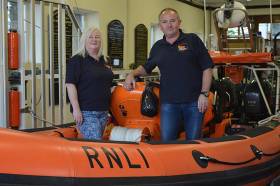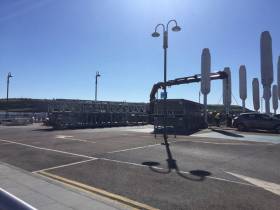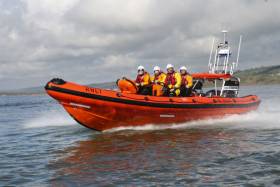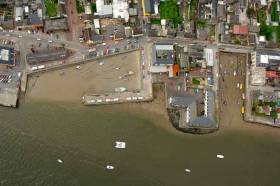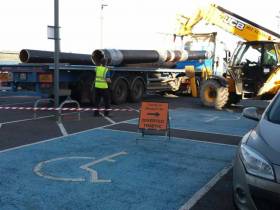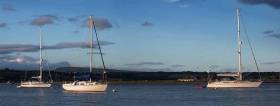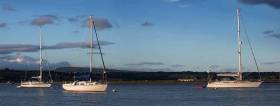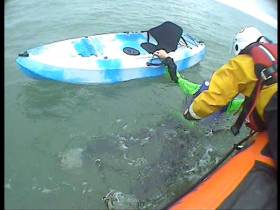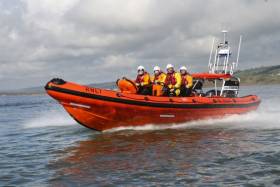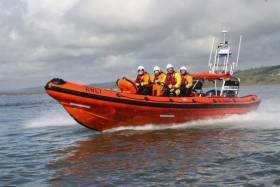Displaying items by tag: youghal
Youghal RNLI Volunteers Invited To Queen’s Garden Party
#RNLI - Two long-serving volunteers from Youghal RNLI in East Cork have a royal engagement at Buckingham Palace next week.
Former station mechanic Seamus Mason, who has been a lifeboat volunteer with the RNLI for 30 years, and his wife Susan, secretary of the fundraising branch in Youghal, will attend the Queen’s Garden Party in Buckingham Palace next Tuesday 5 June.
Every year Queen Elizabeth II hosts three parties at Buckingham Palace and one at Holyrood Palace in Edinburgh as a way to recognise and reward public service.
Seamus was nominated to attend the garden party by his area lifesaving manager Joe Moore in recognition of his service and dedication to Youghal RNLI over the last three decades.
“Seamus is the backbone of the lifeboat station in Youghal and is well thought of not only by the volunteers in the station but by visitors as well, including regional staff - he is held in high regard by everyone,” said Moore.
Seamus will be joined at the palace by his wife Susan, who herself has dedicated more than 15 years to the charity as a fundraising volunteer.
Over the course of each year, Queen Elizabeth II welcomes over 30,000 guests to spend a relaxed summer afternoon in the beautiful gardens of Buckingham Palace or the Palace of Holyroodhouse.
A similar party was held at Hillsborough last autumn, where two couples who volunteer with Larne RNLI rubbed shoulders with the recently wed Prince Harry.
Youghal’s New Pontoon Now Under Assembly
#Youghal - The components for Youghal’s new marina pontoon have arrived, and the amenity is currently being installed in the East Cork town.
Preparation for the new embarkation pontoon began last November with pile driving works in the harbour, as previously reported on Afloat.ie.
The pontoon marks the fruition of longstanding community efforts to build a marina for the town — and is hoped to “bring a welcome boost to our capability as a destination for marine tourism”, according to the Build a Marina in Youghal page on Facebook.
Youghal Lifeboat Assists Fishing Boat Taking On Water
#RNLI - In the East Cork lifeboat station’s first callout of 2018, Youghal RNLI was requested to launch at 1.02pm on Wednesday 10 January to reports of a fishing vessel that was taking on water.
The lifeboat proceeded to the location of the fishing boat, with one onboard, near Whiting Bay. Conditions saw a choppy sea state at the time, with a moderate southeasterly breeze.
Helmed by Erik Brooks and with crew members Liam Keogh, Mick Brooks and Eddie Hennessy onboard, the lifeboat reached the vessel and quickly assessed the situation to find a good deal of water onboard.
Two of the crew boarded the boat with a salvage pump and started to pump the water overboard.
Waterford’s Irish Coast Guard helicopter Rescue 117 arrived on scene to give air assistance and stayed in the area until the vessel was returned safely to Buttimer’s Quay and Youghal Coast Guard.
Speaking following the callout, Youghal RNLI helm Erik Brooks said: “The skipper did the right thing by calling for help quickly today and we were delighted to bring the fisherman and boat to safety.
“We would remind anyone planning a trip to sea to always respect the water. Always carry a means of communication with you when you are on the water and remember to let someone ashore know when you leave and when you are due back.”
In other Irish lifeboat news, Clifden RNLI's all-weather lifeboat Fisherman’s Friend was requested to launch at 8.50am on Tuesday morning (9 January) to investigate reports of a white light west off Eeshal Island in Co Galway.
At 9.10am, the all-weather lifeboat was underway to investigate with six volunteer crew on board and in difficult weather conditions of 3-4 metre seas and a south easterly Force 7-8 wind.
The boat proceeded to Eeshal Island and conducted a thorough search around Omey Island, Aughris Point and Cruagh Island.
When nothing was found after some time, Malin Head Coast Guard was satisfied that the light seen was most likely from a 25m fishing vessel that had passed by the area that morning and did not indicate a vessel in difficulty.
Clifden RNLI coxswain James Mullen said later: “This call was reported with good intent and we would like to thank the member of the public for their vigilance.
“Given the prevailing weather conditions this morning, the all-weather boat was an excellent asset and well done to all the crew for assembling and launching so quickly.”
Harbour Master Job Advertised for Youghal
The east Cork port of Youghal will soon have its own Harbour Master following the recent advertisement posted by Cork County Council on its website.
The local authority is seeking a 'full-time and pensionable' Harbour Master for the port that has recently had visitor moorings and pontoons installed at its quay.
The funding announcement of €112,500 for the development of a pontoon and gangway in Youghal was made last April and news of the proposal broke on Afloat.ie last March here.
Eight visitor buoys were put in place in Youghal harbour and these have been very successful in attracting marine leisure tourism to the town. It is hoped the addition of the pontoon will build on the success of these buoys andenhance Youghal’s marine tourism offering and lead to an increase in visitors.
Click for Youghal Harbour Master Job application form and details here
Embarkation Pontoon for Youghal in County Cork is Underway
An 'Embarkation Pontoon' at Youghal Co. Cork is underway allowing boating visitors to get on and off their boats without having to resort to dinghies.
According to the local 'Build a Marina in Youghal' Facebook page, pile driving will be undertaken next week, followed by the testing of the piles.
The pontoon is being manufactured off site. The installation of the pontoon and gangway will take approx three days and is scheduled to happen the 1st week in December. The pontoon will not be left in the water over the winter months.
Last year visitor moorings were installed in Youghal to facilitate visiting boaters.
Afloat.ie readers will be aware of the community efforts to build a marina in the town to 'achieve a positive maritime impact for the town and it's prosperity'.
‘Tangled Chain’ Claims Prompt Probe Of Youghal Mooring Buoys
#Youghal - Newly installed mooring buoys in Youghal Harbour are being examined after claims that a tangled chain almost pulled a visiting yachtswoman overboard.
According to the Irish Examiner, the woman and her husband commented in Youghal Sailing Club’s Facebook page about their experience at the harbour on 16 July last.
They described finding the mooring buoys at Nealon’s Quay hard to locate as they were half submerged, and when they did manage to avail of one, it was difficult to hook onto as it had “too small an eye”.
It was on attempting to lift this buoy that they discovered it would not budge due to a tangled chain, and the woman had to drop her hook for fear of being dragged overboard.
The couple also complained of an unusually small shackle on a larger buoy nearby — and suggested a pontoon as a more workable solution for visiting boats in the East Cork harbour.
The eight moorings were installed last year at a cost of €35,000, and East Cork Municipal District said there is “no intention of replacing” them.
Funding of €112,500 was confirmed earlier this year for the development of a pontoon and gangway in Youghal, as previously reported on Afloat.ie, but there is as yet no firm timeframe of the project.
Green Light for Youghal Pontoon As Funding Approved
Cork East Fine Gael TD and Minister of State at the Department of Justice, David Stanton has welcomed the funding announcement of €112,500 for the development of a pontoon and gangway in Youghal.
News of the proposal broke on Afloat.ie last March here.
“The announcement is great news for Youghal and will allow for the supply and installation of a pontoon and gangway in Youghal Harbour. Cork County Council has done a huge amount of work to get this project underway and has already secured the necessary planning permission and foreshore licence to allow the development to proceed”, said Minister Stanton.
“Last year eight visitor buoys were put in place in Youghal harbour and these have been very successful in attracting marine leisure tourism to the town. I am confident that the pontoon will build on the success of these buoys and greatly enhance Youghal’s marine tourism offering and lead to an increase in visitors to this historic town.
“This funding is another substantial investment in Youghal’s tourism product. In addition to the development of Youghal’s heritage trail which includes the Raleigh Quarter, the medieval town walls, St Mary’s Collegiate Church and gardens next door, Youghal Clock Gate was opened to the public at the end of last year and is proving very popular. The refurbished boardwalk is also widely used by locals and visitors alike.
“Youghal wastewater treatment plant is also due to be completed by the end of this year and this project along with the other wastewater infrastructure works will allow for further development in the town into the future.
“I am very pleased that Youghal pontoon project has been awarded funding under the Local Authority Harbour programme. This scheme provides for 75% funding by the Department of Marine with the balance being supplied by Cork County Council. I would hope that, if this project is as successful as expected in attracting visitors to the town, this project would lead to further investment in marine leisure facilities in Youghal in the not too distant future.
Youghal Lifeboat Rescues Man Found Clinging To Kayak
#RNLI - Youghal RNLI has rescued a man who was found clinging to his kayak yesterday afternoon (Sunday 19 February) after he was in the sea for up to 45 minutes.
The volunteer crew was requested to launch their inshore lifeboat at 2pm after a member of Youghal Coast Guard who was driving past Redbarn beach observed what he thought to be someone in trouble in the water.
The lifeboat, helmed by Patsy O’Mahony and with crew members John Griffin, Eddie Hennessy and Martin Morris onboard, launched at 2.08pm and arrived on scene four minutes later, where they found the kayaker had got into difficulty one mile from the beach.
Weather conditions at the time were described as good, with a Force 2-3 north-westerly wind. The tide was falling and the water while calm was cold.
On scene, the lifeboat crew observed the kayaker clinging to his board. He had been unable to get back into the seat on top of the kayak and was showing signs of hypothermia after being immersed in the cold sea for up to 45 minutes.
The casualty was quickly recovered from the water and administered casualty care on the lifeboat and back at the lifeboat station until a doctor from the East Cork Rapid Response unit arrived. The kayaker was then transferred by ambulance to Cork University Hospital.
Speaking following the callout, Youghal RNLI lifeboat operations manager Derry Walsh said: “The kayaker, who was wearing a lifejacket when he got into difficulty this afternoon, had been in the water for a long time before he was spotted and he was suffering from hypothermia when we reached him. Time was of the essence and I have no doubt that a life was saved.
“I would like to commend the member of the public and the member of the coastguard unit here in Youghal who spotted the kayaker in difficulty and raised the alarm. Our crew responded rapidly and used their skills and training to administer casualty care. The kayaker was lucky today and all at Youghal RNLI would like to wish him a speedy recovery following his ordeal.”
Walsh added: “We would always encourage everyone taking to the sea to respect the water. Always carry a means of calling for help and keep it within reach. Wear a personal floatation device. Check the weather and tides. Tell someone where you are going and when you will be back. Wear appropriate clothing for the conditions and your trip.”
Youghal RNLI Assists Two On Fishing Vessel In First 2017 Callout
#RNLI - Youghal RNLI came to the assistance of two people last weekend after their fishing vessel got into difficulty off the Cork coast.
The volunteer crew was requested to launch their inshore lifeboat last Saturday (27 January) at 3.55pm to reports of a vessel in need of assistance.
The lifeboat proceeded to the location of the 21ft fishing boat a half-mile east of Black Ball Buoy.
The weather on the day was fine with a slight south westerly breeze.
The lifeboat, helmed by Patsy O’Mahony and with crew members Liam Keogh, Jason Clossey and Jack Nolan onboard, returned the boat under tow safely to his moorings in Youghal Harbour.
Speaking following the callout, Youghal RNLI deputy launching authority Brendan O'Driscoll said: “We were happy to come to the assistance of the fishing crew and bring them to safety.
“We would also like to congratulate Jack Nolan on a job well done on his first callout since he moved from shore crew to full crew in January.”
Youghal Lifeboat Launches To Man Taken Ill On Angling Boat
#RNLI - Youghal RNLI’s volunteer lifeboat crew were tasked yesterday morning (Saturday 15 October) in choppy waters to reports of a man taken ill on board a chartered angling vessel.
At 11.30am the lifeboat launched to the location around a mile and a half off Capel Island, where the casualty had been unconscious for a period and was pale in appearance.
The lifeboat crew proceeded to administer casualty care when they recovered the casualty on board.
An ambulance was also requested and was awaiting the lifeboat on its return to station, where the paramedics checked the casualty over before giving him the all clear.
Commenting on the callout, Youghal RNLI lifeboat Helm John Griffin said: “[The charter vessel operators] did the right thing in contacting us when the man became unwell.
“It’s always better to get an ill person medically checked out if there are any concerns.”



























